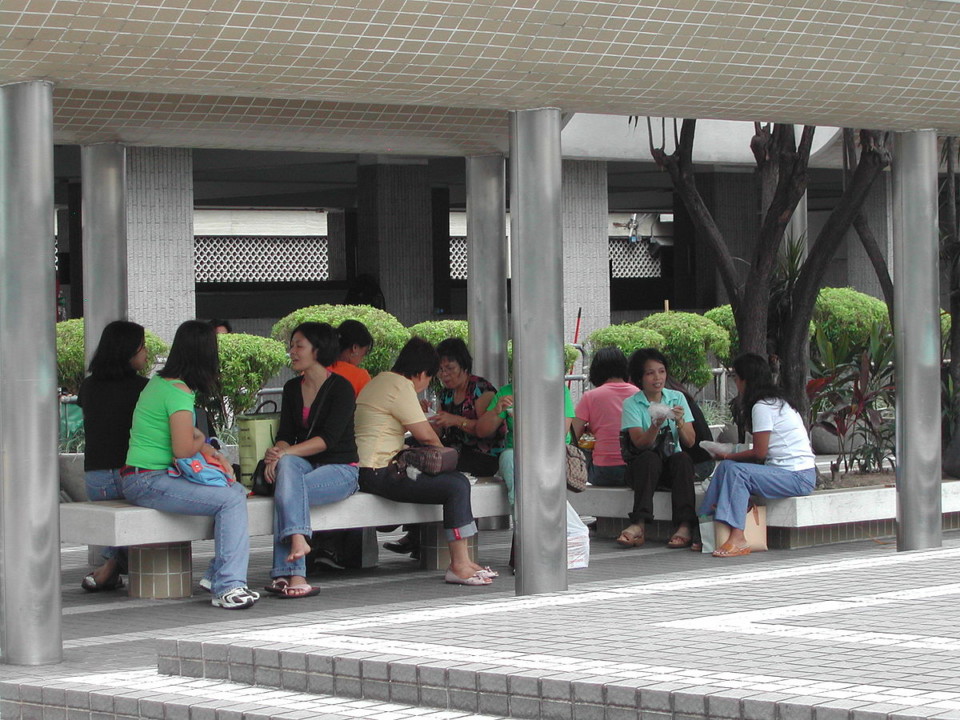Every year thousands of young women from the Philippines, Indonesia and other impoverished countries make the pilgrimage to the bright lights of major first world cities in the Middle East and Asia to support their families. For first timers this can be a daunting experience, often exploited by unconscionable recruitment firms in their home countries they arrive in a foreign land, in a lot of debt to move into a stranger’s home. Assuming that their employer treats them well (which in many cases is not the case) these young, naive women have to come to terms with a lot of things in a very short space of time.

Many people in the Philippines and foreigners associated with the Philippines may not be aware of what actually goes on in cities like Hong Kong. I’m not talking about the obvious cases of abuse either (more on some of those a bit later). I’m talking about stuff that on the surface seems legitimate, stuff that is even often legal but stuff that can get a young woman in a large amount of trouble. It is the girls on their first tour of duty that are extremely vulnerable to this sort of thing.
The recruitment process
In the eternally opaque environment that is the Philippines it is not uncommon for maids to arrive in Hong Kong with a significant level of indebtedness. These debts are often incurred as a part of the recruitment process outside of Hong Kong (they are in fact illegal according to both Hong Kong and Philippine law). If a person applies through a Hong Kong agency the maximum fee payable by the applicant is one tenth of one month’s wages. All other costs should be taken care of by the Hong Kong employer. These are things like medicals, visa fees and airline tickets.
The POEA in the Philippines has stipulated that no recruitment fees can be charged to helpers applying through an agency in the Republic. While fees can be charged for training and various other things related to the placement, there can be no placement fee levied in and of itself. In practise this is seldom adhered to with applicants often being charged in excess of 100,000 pesos for the placement (I have personally been made aware of 5 cases where the placement fees ranged from 50,000 to 200,000 pesos), especially if they appear desperate to the unscrupulous recruiters.
To put things in perspective 100k is close to five months wages in Hong Kong. In the majority of cases the applicants do not have access to amounts of money like that (which is why they’re applying abroad in the first place) and this can result in the recruiters strong arming them into taking out high interest loans.
While most employment agencies in Hong Kong are above board there are some that are not and those that aren’t will often collude with agencies in the Philippines to have the worker borrow from a Hong Kong based loan shark to pay back the debt in the Philippines. The workers are then threatened with their employers being visited by enforcers in the event of missing a payment and are also often forced to furnish the lenders with details of their families at home.
Assuming that they make it through the recruitment process relatively unscathed there’s more fun waiting for them when they get settled in.
Predatory lenders in Hong Kong
It’s not just loan sharks that people have to be concerned about, there are a number of mainstream financial companies which have loan products targeted at domestic helpers in Hong Kong. I knew of a case of an Indonesian girl in Hong Kong who, within a month of arriving, went to one of these outlets where the signage, brochures and contracts are all in multiple languages, including Bahasa Indonesia and they have native speakers at the desks.
She was approved for a loan of $35,000 Hong Kong dollars after furnishing the lender with a copy of her contract. That’s nearly one year’s wages. Repayments were an affordable 80% of her salary and the interest rate was 18%. As a part of the application process she was asked for the full names and addresses of three family members in Indonesia and her employer’s full contact details. While it was not explicitly stated it was very strongly implied that if she missed her repayments all of these details would be used to full effect.

As if that wasn’t bad enough. There is no central credit reporting for foreign helpers in Hong Kong and the lenders do not share information. The applicants are asked at the time of the loan if they have any other debts, it is as simple as ticking no on the form. As it was this girl’s first month in Hong Kong she was already carrying a debt to money lenders in Jakarta of $18,000 Hong Kong dollars.
She subsequently spent the 35 thousand on laptops, smartphones and treating her friends to meals and was left totally unable to service her financial responsibilities. In order to meet her bills she spent her Sundays selling her body to foreigners in bars in Wan Chai. While prostitution is legal in Hong Kong, breaching the terms of a work permit is not. This left her open to arrest and potential deportation for being in breach of the terms of her visa.
As a result of this, in the event that she was raped, brutalized or a client refused payment she had very little recourse with the authorities. In the event that she had ended up injured or pregnant she would’ve had to go to her day job employer and ask to see a doctor, which would probably be a pretty uncomfortable conversation and one that may well result in her being terminated.
As much as this particular woman brought a lot of what happened on herself as a result of bad decisions. Before the keyboard warriors leap forth into the comments and start saying that, consider a few things. This girl was from a small town on the coast of Java, had practically no education and certainly no financial education. She found herself in a situation where she all of a sudden had access to what seemed like untold riches. She was not made aware of the severity of the consequences during the process nor had anyone warned her as a part of the recruitment process.
Of course assuming the worker does make it through running the gauntlet of predatory companies attempting to make money off them, there are other risks as well.
Predatory people

In what has been a highly public trial in recent days, Rurik Jutting, cokehead, alcoholic former banker in Hong Kong is in the dock on charges of torturing and murdering two young Indonesian women. Women he met in Wan Chai (just one more example of the risks the girl I mentioned previously was taking with her safety). Naturally not every bloke trolling Lockhart Road for a bit of Sunday skirt is a psychotic murderer. The risks are there though.
Once again I’m sure readers are thinking that if girls will go out and do things like that then they will face the potential consequences of their actions. In a far less public trial a Tuen Mun man is up on charges of rape. He raped his Filipina Domestic Helper in 2015 while his wife and child were up at the shops. In his home, where she lived. The woman has since returned to the Philippines and the Hong Kong authorities are trying to find her to come and give evidence. In the highly unlikely event that she is located, willing to give evidence and in a position to go and sit it out in Hong Kong during the trial he may get convicted.
That said, he said, she said sex cases are always complicated. There is a running joke among the boys in Hong Kong that if a wife wants an excuse to divorce her husband all she needs to do is hire a pretty pinay maid and let hormones take care of the rest. What about the case of Erwiana Sulistyaningsih?
https://www.youtube.com/watch?v=lB-oVHfS-nU
This young woman, also from Indonesia, was subjected to horrific abuse by her female employer. Beatings, starvation, non payment of wages. When the case came to light the Hong Kong Police initially refused to launch an investigation, although they eventually did. This resulted in the imprisonment of her employer, a good result, how many cases go unprosecuted though?
Of course predators often pop up long before the girls even leave their home country. That’s how Mary Jane Veloso ended up copping the death penalty in Indonesia after an illegal recruiter, very well known to her and her family, tricked her into carrying a bag of heroin into Indonesia. Prior to this Mary Jane had been working in the Emirates for six months, why did she quit that job? Her employer attempted to rape her. No case was filed, of course. As we all know how that works in the UAE.
Now I’m not suggesting that these calamities befall every maid in Hong Kong, I know many women up there that are being properly taken care of by their employers. That said, it does happen and it happens a lot more than you might think. There are myriad NGOs in the SAR that specifically work with abused and maltreated domestic helpers.
The level of bad treatment can be anything from not living up to the financial responsibilities laid out in the employment contract to not providing adequate sustenance right up to rape and torture. In cases like this it is new arrivals on their first contract that are overwhelmingly represented and the only way to stop that from happening (aside from completely stopping the practice of working abroad) is to make sure that they are properly educated about the potential pitfalls before they leave.
Hong Kong has a robust legal system and abused helpers do have a legal recourse, but they need to know who to ask for help, what help is available to them, what constitutes a breach of their human rights and the laws of Hong Kong.
READ MORE: A guide to working in Hong Kong for Filipina domestic helpers
Follow our Facebook page for daily updates
…
